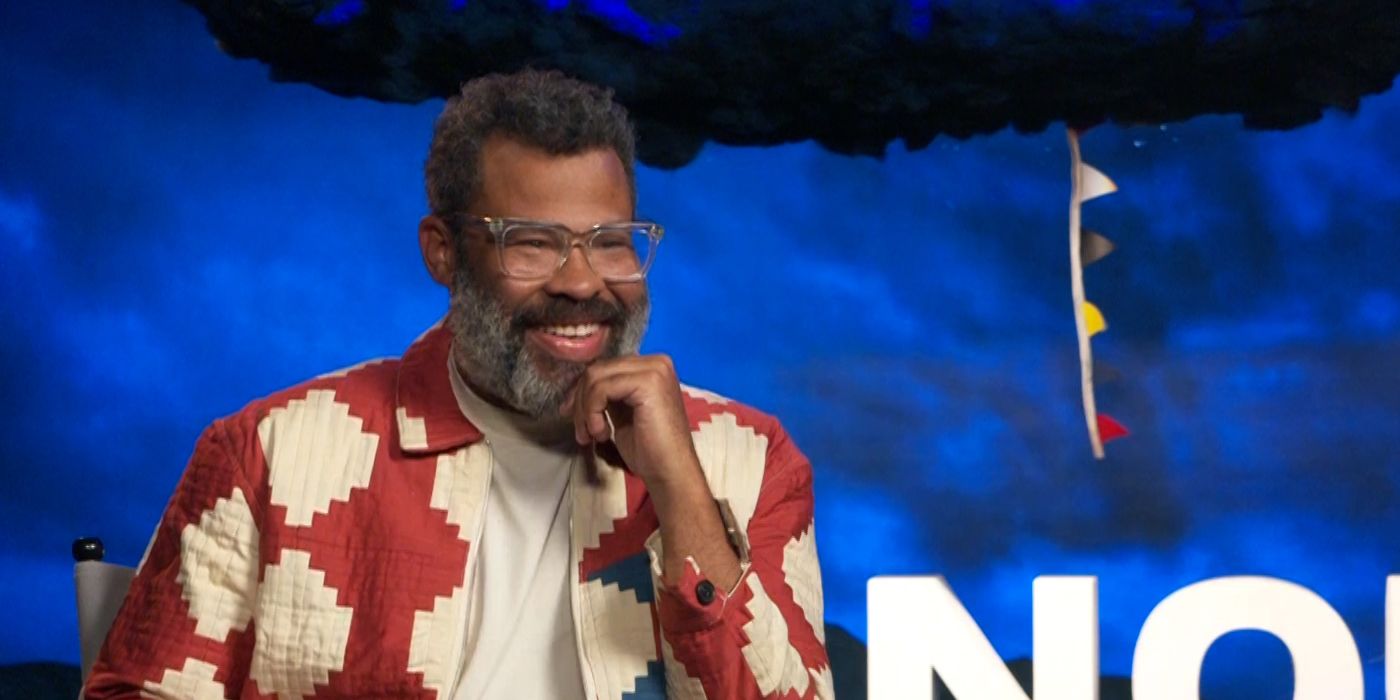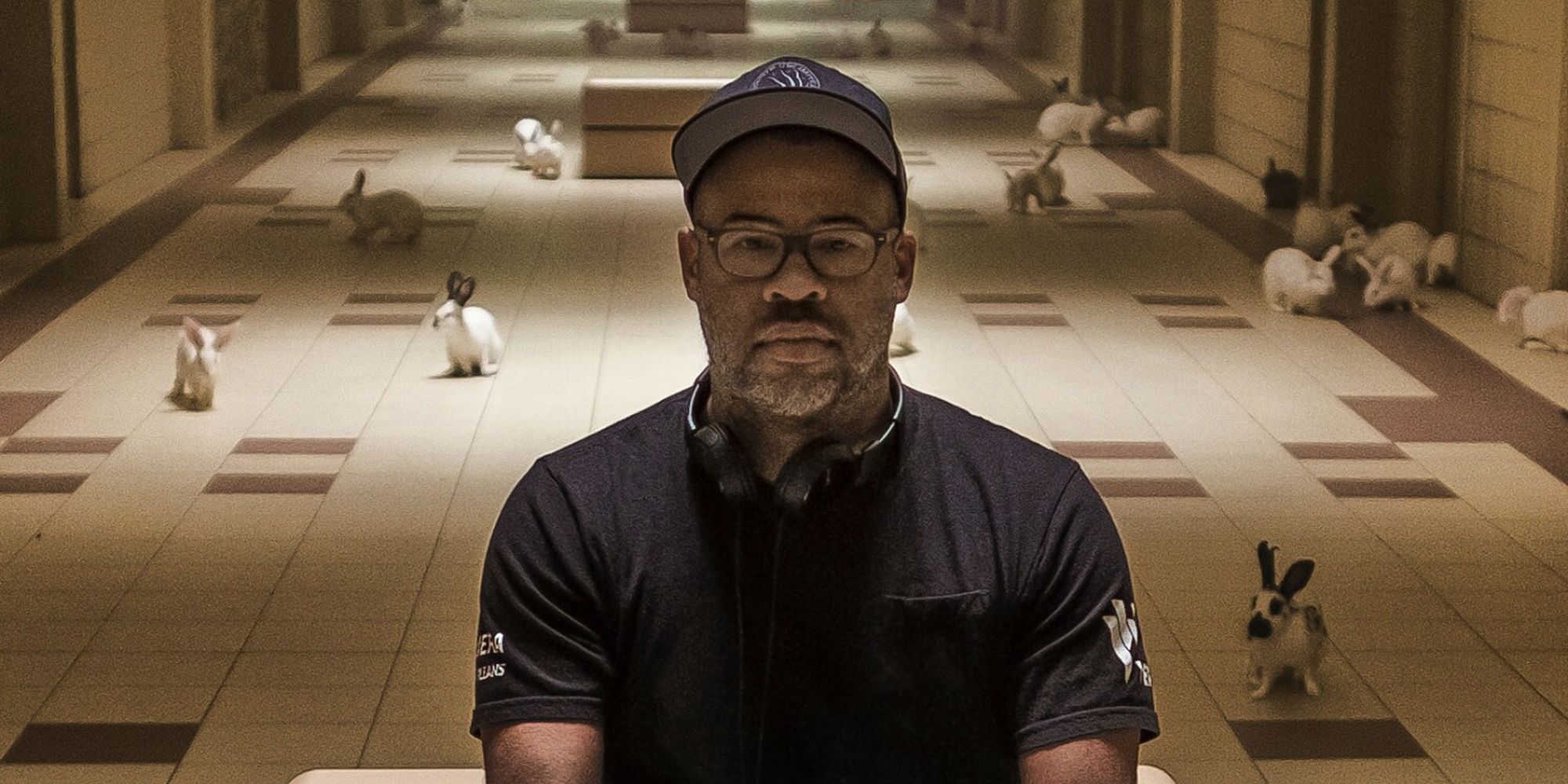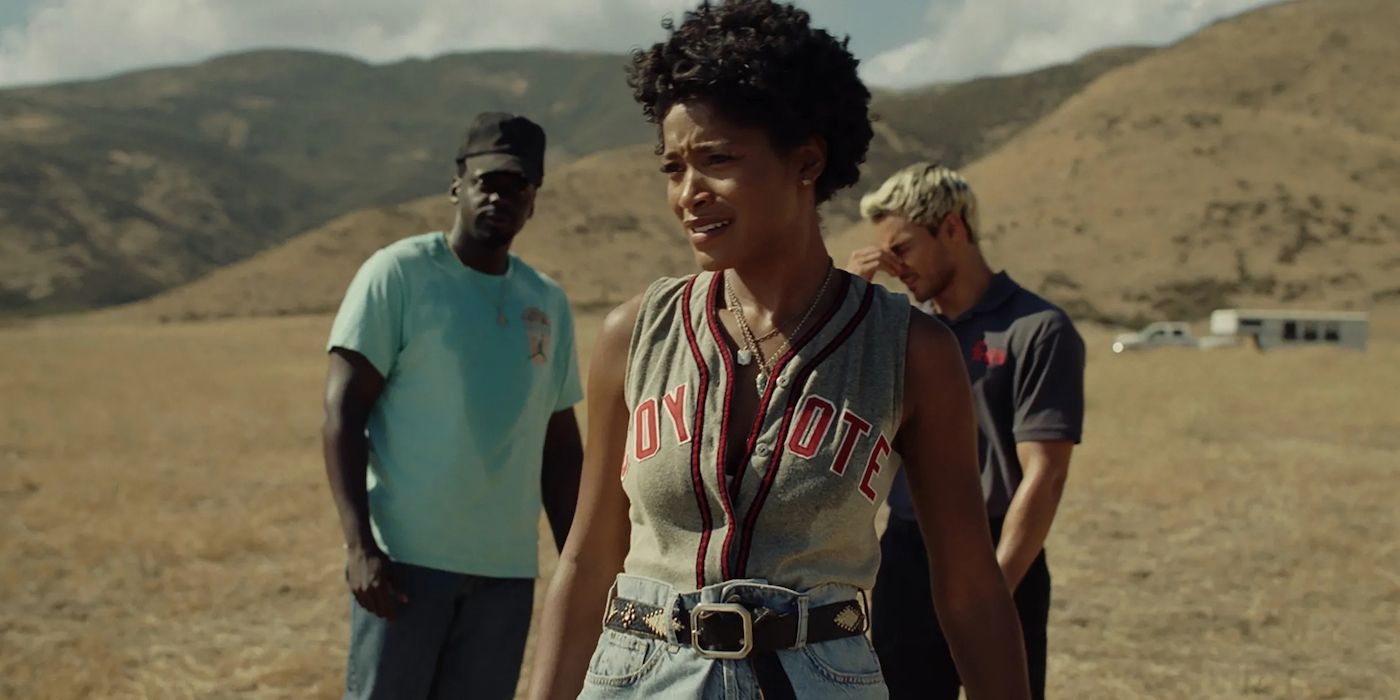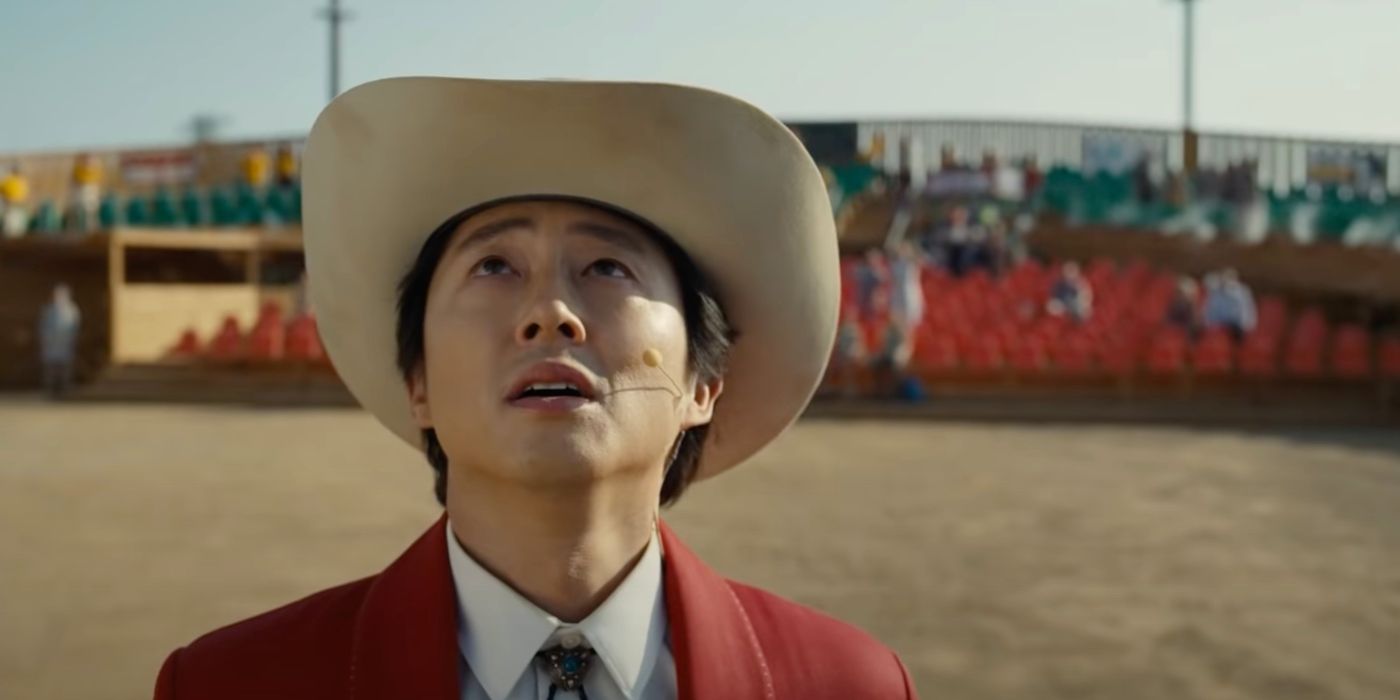With Nope about to open in movie theaters, I recently had the chance to sit down with writer-director Jordan Peele to talk about making his fantastic new film. During the interview, Peele talked about his love of David Fincher’s work like Mindhunter, and how Seven was a formative experience, why he wanted to work with cinematographer Hoyt Van Hoytema and shoot Nope using IMAX cameras, and how he worked with editor Nick Monsour to cut the movie. In addition, he talked about why he didn’t want to direct Akira, even though the animated film is one of his favorite movies.
While I know a lot of you love to learn everything you can about a movie before you see it, I’d recommend watching Nope knowing as little as you can. But for those that need to know something… Nope is about a few residents in California who bear witness to an uncanny and chilling discovery. The film stars Daniel Kaluuya, Keke Palmer, Steven Yeun, Brandon Perea, Barbie Ferreira, and Keith David.
Finally, I strongly recommend seeing Nope in an IMAX theater. Peele shot the movie using IMAX cameras and the best way to experience the film is in an IMAX theater.
You can either watch what Peele had to say in the player above, or read the conversation below.
Before the cameras were rolling we were talking about David Fincher and intervews. Which is why it starts with me talking Fincher...
COLLIDER: [I had an] interview with [David] Fincher in his office, and I was scheduled for 45 minutes, prepped for 24 hours. His first two answers took 15 minutes, and I literally stopped the interview and said, "David, I really need you to go faster. This is not working for me."
JORDAN PEELE: This isn't working. I have written questions. I have a job too.
I have sections. We are not getting through this, you know what I mean?
PEELE: Can we talk about Fincher for a second? Because I mean Seven was pretty formative for me.
I think David Fincher movies, when they get released, they should be national holidays.
PEELE: Yes. I mean he's a treasurer, and is he American or British? I don't know, I've never met him.
Oh, he's American.
PEELE: He seems like he's got a British-like integrity about him. I remember when he did Alien 3. Such a dark film, such a great third film of a franchise I thought. So I'm obsessed, anyway.
We could talk ... I mean I have a lot of questions for you, but we could talk Fincher. Did you watch Mindhunter?
PEELE: Yes.
Okay. So Mindhunter to me is the best thing Netflix has ever done by a mile. I think Mindhunter is genius. I don't know if you enjoyed it or?
PEELE: I cannot think of a better thing on Netflix than Mindhunter, and I've watched the first season and I thought it was incredible. And yeah at some point, I'm going to have to take on the psycho killer subgenre as some of my great influences have.
Well, first of all, it's ripe for… I mean there's a million stories out there. The last time I spoke to Fincher, which was for Love, Death + Robots, I said to him-
PEELE: Which is cool.
Absolutely. I said, "What do I need to do to start a GoFundMe for Mindhunter Season 3, because I will do it, and I will give you $20 if you want to make it."
PEELE: Well, I will forge ahead, and I got to watch this next season, obviously.
100%. It really is, I think it's phenomenal.
PEELE: I can tell we have the same taste.
Yeah. It's called quality entertainment. So I could talk about Fincher with you the whole time and other directors, but I really want to thank you for what you do and for making movies, because you have made three great films that I really recommend to everybody. I have a million things to ask you about Nope, but I like throwing a curveball at the beginning. If you could get the financing to make anything you want, what would you make and why?
PEELE: Wow. It's a great question.
No budget, whatever you want. And it could be even any IP. What's like the dream?
PEELE: Well see if I told you, that would be giving you the scoop of the century, wouldn't it?
Maybe.
PEELE: What if I get to make this movie someday? Will I have wanted to announce it and when it was just the glimmer of a thought?
How about this? I won't put you on the spot, but is there something, like a genre or an IP, like something that maybe people don't associate with you, that you're thinking about?
PEELE: You know what? I think the thing about it is, no matter how many IPs I think about taking on, I feel like I have this responsibility to myself and to people to tell my own stories. So I don't know if there is going to be an IP that will do it. You know, Akira is one of my favorite films and formative. There was a world where I thought maybe I should take that on or something like that on, and I think my conclusion was that I've got my own work to put forward and Akira is perfect. It's perfect. So, that's kind of where I am.
I love that you shot this in IMAX and you worked with Hoyt (Van Hoytema) and you used IMAX cameras. When did you realize you wanted to play in the IMAX arena?
PEELE: It came with the very sort of foundation of the film, although I might not have known to say it when I first sort of uttered this thought of making a totally immersive UFO film. So I talked to Hoyt, and obviously scope was a big thing and I wanted to push myself and I asked him, "How would you capture actual UFO? If you had one chance, what camera would you use? And that's what we should use in the movie, both in the movie and in the meta way." And he said, "The IMAX cameras." I don't know if he just really wanted to make an IMAX movie, but no. Obviously, he has so much experience in that realm. What he told me is true, there's a different kind of immersion that happens with IMAX and there's a different kind of resolution. So for posterity alone, they send these cameras up to space.
Do you see yourself using IMAX cameras in your future movies the way that Nolan does?
PEELE: Yes. Look, every story needs to be told in its own individual way. So I won't be like an absolutist about how to shoot something or what to shoot something on, but once you direct in IMAX, there's a real intoxication that happens. It's hard. The possibilities open up so much when you see that format and you feel like, "Oh, wait a second. I can be somewhere in a more real sense." It's pretty addictive.
I love talking about the editing process because that's ultimately where this whole thing comes together.
PEELE: Yeah.
I love learning about first cuts versus finished films, so did you have a much longer cut of this?
PEELE: Yes. My editor is Nick Monsour, he's the guy I worked with in Us. He's just a brilliant guy and a brilliant collaborator. The first cut, I don't remember, I feel like it was three hours and 45 minutes.
For people when they hear that, that's like an assembly cut though. That's literally everything.
PEELE: Yes, which is fairly typical. It may have been more, it felt like a whole lot of movie, and it was, and it is a whole lot of movie. So part of my journey sort of crafting a film is finding the real essentials of a story, both from a plot standpoint, but also from the feeling and mood of it. He did a fantastic job.
What was the last thing you cut, the last scene you cut before you picture locked, and why?
PEELE: Let me see, let me figure out a creative way to answer this, okay? Let's just say this. Okay, Keke Palmer, I've never really worked with her in a real sense. I worked with her briefly on Key and Peele, but she's a brilliant improviser it turns out, as well as a brilliant actor and great at memorization. So let's say, that first speech where she comes out, and she's actor, singer, dancer, and she's giving the safety speech. I mean she gave me about 20 different reads and takes and options, and it was just one of those moments where you see somebody showcasing all the talents that they've learned to take the written word, but also kind of go off and make it their own. That's why I'll say that was one of the hardest things to choose.
Completely. I've heard this from other filmmakers, like “Which take do you actually go with when 10 of them are fantastic?”
PEELE: Her dancing. It's like you could've just left the camera on, she's just cracking me up with her dancing. So it's very interesting. Comedy ends up being one of the more difficult things to edit, if not the most difficult because every frame can cascade the whole dynamic into a different direction.
Well, the other problem is, and a lot of directors have told me that they'll find a sequence that they love. They have it there, then they're watching it after two months, and they're like, "Well, this isn't funny," and then they take it out and only a test screening that reminds them, "Oh, that's still funny."
PEELE: Yes. With comedy, there's so much investment in trying to figure out what an audience will like. Often I feel like if you're having fun, then the audience can feel it. If you're not having fun, the audience can feel that. That's kind of when you're in front of a live audience, that tends to be the truth. When you edit it, it's not always true like that. When you edit it, sometimes the most boring thing to shoot ends up being brilliant. For whatever reason, it all comes together, and vice versa, something that was absolutely a blast on the day and had the whole crew cracking up, can fall flat. That's why every kind of piece needs to be calibrated.
Nope opens in theaters tomorrow.


.jpeg)


-2.jpeg)
